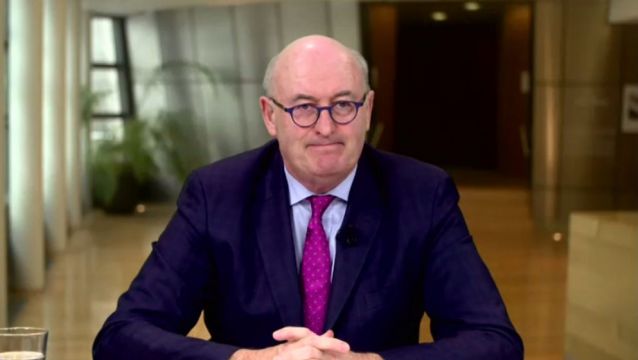Taoiseach Leo Varadkar has said Phil Hogan had to pay a high political price over the Golfgate controversy after the former EU commissioner launched a scathing attack on how he was treated.
The former high-profile EU trade commissioner, who was seen as an influential Irish voice in Brussels during the Brexit negotiations, resigned in August 2020 amid controversy over his attendance at a golfing event in Clifden, Co Galway.
In an RTÉ documentary to be aired this week presented by Sean O’Rourke, who also attended the Golfgate dinner, Mr Hogan indicated that Mr Varadkar and then-taoiseach Micheál Martin had acted on “a populist wave of indigitation”.
Although admitting that he had been “sloppy” with Covid regulations at the time, he emphasised that “I didn’t break any rule, or any law”, and suggested that information had been fed from the Irish Government to the European Commission at the time.
Speaking to reporters on Wednesday afternoon, Mr Varadkar said he has not heard the interview with Mr Hogan.
“I appreciate that Phil Hogan paid a very high price politically, more so than anyone who attended that particular event.
“It was probably inevitable given the domino effect and the context of the time.
“But I think it is regrettable that there wasn’t some sort of process, perhaps at European Commission level, and ultimately it was the president of the European Commission who’s accountable, not to us or the Dáil.
“And I think that everyone should be afforded due process and a fair hearing, and I’ll certainly try to make sure that’s the case into the future.”
Tánaiste Micheal Martin said that the context of the time was “very clear”, and that the Government had put strict restrictions in place for counties Kildare, Laois and Offaly.
“And I remember deputies getting back on to me saying ‘it is visceral’ – before anything emerged about the individual case – in terms of the public’s reaction to what the Government had done in terms of having to put new restrictions (in place).”
He added that there was “huge public anger” at the time which led to the resignation of Dara Calleary as both minister for agriculture and Fianna Fáil deputy leader.
“The other parallel point I would make is that there was actually a significant degree of opportunity and engagement between then commissioner and the president of the Commission.”
In response to the claim from Mr Hogan that information had been fed to the Commission, Mr Martin said: “There is some implication I think that somehow we were driving or feeding stuff into the Commission”.
“No we were not. We had no involvement with the president of the Commission in respect of anything prior to the decision of Phil Hogan to resign at the time – completely at arm’s length in terms of any connection between government and the president of the Commission, I want to be very clear about that.”
Mr Martin added: “That said, I think the entire episode was very regrettable. No one in advance of this ever envisaged a situation where the European commissioner would find himself in the position that he would have to resign.
“But the context was very clear at the time as well. And the public anger was very, very real, in terms of people who are being asked to do extraordinary things in their own personal lives in terms of attendances of funerals, of their loved ones.
“That’s the context in which I think everything unfolded.”
When asked further if the Government had been wrong, Mr Varadkar added: “I think what I’d suggest is go back to the statement that he issued at the time of his resignation.”
In that statement, Mr Hogan expressed his “deep regret” that his trip to Ireland had caused “concern, unease and upset”, issuing his “heartfelt apology to the Irish people for the mistakes I made during my visit”.
Mr Varadkar continued: “He explained at the time why he was resigning, and that was a decision that he made and he gave his reasons at the time. It’s not for me to interpret them after the fact.”
When asked if he regrets Mr Hogan’s resignation, he added: “Look, I regret that that event ever happened, and a lot of people in politics and not in politics paid a very heavy price for that.
“And I think we would all have preferred it if it didn’t happen, but you can’t change what happened to the past, all you can do is try to make the future a bit better.”







